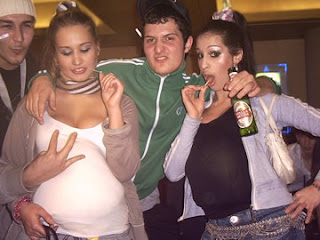The Rise of the Chavs
Since speaking with Helen, I have decided that I will investigate the rise of Chavs, during the noughties, how they came about, who they are, the impact they have on society and the way they are represented in the media.
Chavs are said to be aggressive, arrogant teenagers, and young adults. They tend to be of underclass background, who repeatedly engage in anti-social behaviour.
 The Oxford University press has said that the word is "Generally thought to come from Chatham girls" . Although etymologist Michael Quinion, says the term may come from the Romani word "Chavo" meaning boy and "Chavvy" meaning youth.
The Oxford University press has said that the word is "Generally thought to come from Chatham girls" . Although etymologist Michael Quinion, says the term may come from the Romani word "Chavo" meaning boy and "Chavvy" meaning youth.Chavs tend to live in a strong gang culture, with daily activities including smoking, drinking, petty theft, vandalism and violence.

"Chavs" are also known for their own aggressive language i.e "Mush", "Yeah Boi", "Chavy is loud boi, "Am i bovered", "Bruv", "Don't be dissing me"
Chavs are typically unemployed, living in council house accommodation, and relying on benefits. They are highly sexed, promiscuous, and fall into the high teenage pregnancy category. Parkwood in Maidstone is a typical "Chav Central", which also has the highest teenage pregnancy rate in Europe.
 "Pimped" up cars are also popular amongst the Chav boys, these are usually Ford Fiestas, Escorts, Vauxhall Novas and Corsas.
"Pimped" up cars are also popular amongst the Chav boys, these are usually Ford Fiestas, Escorts, Vauxhall Novas and Corsas.Their style is trademarked with the tracksuits and "hoodies". Known for owning large amounts of sports clothing and counterfiet designer brands, such a Buberry. Girls are seen wearing lots of "Bling" i.e. big hoop earings and soverign rings, and the popular "baby pink" clothes.
 Burberry and their trademark tartan design became hugely popular amongst Chavs in the early 00's, mainly through counterfeit outlets. Stacey Cartwright CEO of Burberry said " It was mainly counterfeit and Britain accounts for less than 10% our sales anyway". The company have taken a number of steps to move away from this image, byy stopping the sale of their own iconic cap in 2001, and scaling back the use of the tartan material, so that it only appears in the iinside lining of a fraction of their clothes.
Burberry and their trademark tartan design became hugely popular amongst Chavs in the early 00's, mainly through counterfeit outlets. Stacey Cartwright CEO of Burberry said " It was mainly counterfeit and Britain accounts for less than 10% our sales anyway". The company have taken a number of steps to move away from this image, byy stopping the sale of their own iconic cap in 2001, and scaling back the use of the tartan material, so that it only appears in the iinside lining of a fraction of their clothes.Asda have chosen to embrace Chav culture, possibly because a number of their shops are located in less affluent towns and boroughs. Asda have attempted to trademark the word "Chav", and have produced their own version of the popular sweet, lovehearts, using the words, "as if", "respect", "bovered", "chav", "minger" and "whatever". Asda sweet buyer James Davies explained " We thought it was time to update this old favourite, with sayings from characters in shows such as Little Britain, and The Catherine Tate Show, proving us with more and more contemporary slang, we thought we needed to reflect this."
 Some argue the use of the word amounts to a "Simple snobbery and elitism." Some critics have called users of the word "neo -snobs", and it's increasing use raises questions about how British society deals with social mobility and class.
Some argue the use of the word amounts to a "Simple snobbery and elitism." Some critics have called users of the word "neo -snobs", and it's increasing use raises questions about how British society deals with social mobility and class.In February 2005 an article in The Times by Julie Burchill, argued that the use of the word is a form of "social racism" and that such "sneering" reveals more about the "Chav - Haters" than those of their supposed victims.
By 2004 the word was used in national newspapers. Susie Dent's Larpers and Shroomers: The Language Report, published by The Oxford University Press, named it "The word of the year 2004".
Things I want to include and look at
- The word, where is came from.
- A tour of Chatham
- Interviews with local "Chavs" and how they feel as being classed as such by their piers. What they do from day to day, their hobbies and tastes.
- Interview with professionals. Youth Worker?
- Clothing, it's impact, interview with Burberry?
- Use Goldie Lookin Chain music through out, as they are described as a mockery of chavs by some, and a representation of them by others, as well as Lady Sovereign and her song "Hoodie"
- A section about Asda, and it's sweets.
- Famous Chavs, Kerry Katona, Jordan, Wayne Rooney, Tim Westwood, Vicky Pollard.
- Interviews with people who critisise them, i.e. the middle and upper classes
- Why were "hoodies" targeted. Speak to Bluewater about banning them?
- What is being done to help these youngsters break out of the sterotypes, youth centres? Better sexual education?


No comments:
Post a Comment